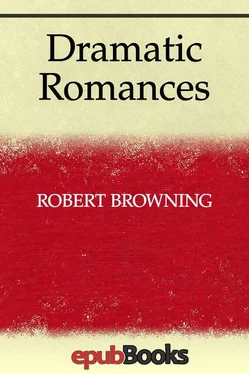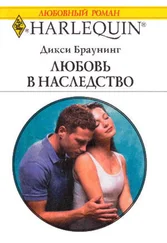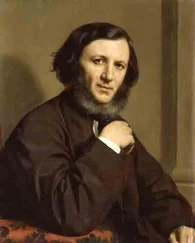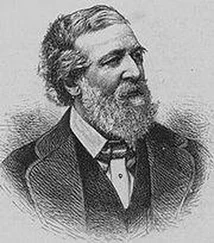Роберт Браунинг - Dramatic Romances
Здесь есть возможность читать онлайн «Роберт Браунинг - Dramatic Romances» весь текст электронной книги совершенно бесплатно (целиком полную версию без сокращений). В некоторых случаях можно слушать аудио, скачать через торрент в формате fb2 и присутствует краткое содержание. Год выпуска: 2014, Издательство: epubBooks Classics, Жанр: Поэзия, на английском языке. Описание произведения, (предисловие) а так же отзывы посетителей доступны на портале библиотеки ЛибКат.
- Название:Dramatic Romances
- Автор:
- Издательство:epubBooks Classics
- Жанр:
- Год:2014
- ISBN:нет данных
- Рейтинг книги:3 / 5. Голосов: 1
-
Избранное:Добавить в избранное
- Отзывы:
-
Ваша оценка:
- 60
- 1
- 2
- 3
- 4
- 5
Dramatic Romances: краткое содержание, описание и аннотация
Предлагаем к чтению аннотацию, описание, краткое содержание или предисловие (зависит от того, что написал сам автор книги «Dramatic Romances»). Если вы не нашли необходимую информацию о книге — напишите в комментариях, мы постараемся отыскать её.
Dramatic Romances — читать онлайн бесплатно полную книгу (весь текст) целиком
Ниже представлен текст книги, разбитый по страницам. Система сохранения места последней прочитанной страницы, позволяет с удобством читать онлайн бесплатно книгу «Dramatic Romances», без необходимости каждый раз заново искать на чём Вы остановились. Поставьте закладку, и сможете в любой момент перейти на страницу, на которой закончили чтение.
Интервал:
Закладка:
IX
So, the little lady grew silent and thin,
Paling and ever paling,
As the way is with a hid chagrin; 210
And the Duke perceived that she was ailing,
And said in his heart, "'Tis done to spite me,
But I shall find in my power to right me!"
Don't swear, friend! The old one, many a year,
Is in hell, and the Duke's self…you shall hear.
X
Well, early in autumn, at first winter–warning,
When the stag had to break with his foot, of a morning,
A drinking–hole out of the fresh tender ice
That covered the pond till the sun, in a trice,
Loosening it, let out a ripple of gold, 220
And another and another, and faster and faster
Till, dimpling to blindness, the wide water rolled:
Then it so chanced that the Duke our master
Asked himself what were the pleasures in season,
And found, since the calendar bade him be hearty,
He should do the Middle Age no treason
In resolving on a hunting–party.
Always provided, old books showed the way of it!
What meant old poets by their strictures?
And when old poets had said their say of it, 230
How taught old painters in their pictures?
We must revert to the proper channels,
Workings in tapestry, paintings on panels,
And gather up woodcraft's authentic traditions:
Here was food for our various ambitions,
As on each case, exactly stated—
To encourage your dog, now, the properest chirrup
Or best prayer to Saint Hubert on mounting your stirrup—
We of the household took thought and debated.
Blessed was he whose back ached with the jerkin 240
His sire was wont to do forest–work in;
Blesseder he who nobly sunk "ohs"
And "ahs" while he tugged on his grandsire's trunk–hose;
What signified hats if they had no rims on,
Each slouching before and behind like the scallop,
And able to serve at sea for a shallop,
Loaded with lacquer and looped with crimson?
So that the deer now, to make a short rhyme on't,
What with our Venerers, Prickers and Verderers, 250
Might hope for real hunters at length and not murderers,
And oh the Duke's tailor, he had a hot time on't!
XI
Now you must know that when the first dizziness
Of flap–hats and buff–coats and jack–boots subsided,
The Duke put this question, "The Duke's part provided,
Had not the Duchess some share in the business?"
For out of the mouth of two or three witnesses
Did he establish all fit–or–unfitnesses:
And, after much laying of heads together,
Somebody's cap got a notable feather
By the announcement with proper unction 260
That he had discovered the lady's function;
Since ancient authors gave this tenet,
"When horns wind a mort and the deer is at siege,
Let the dame of the castle prick forth on her jennet,
And with water to wash the hands of her liege
In a clean ewer with a fair toweling,
Let her preside at the disemboweling."
Now, my friend, if you had so little religion
As to catch a hawk, some falcon–lanner,
And thrust her broad wings like a banner 270
Into a coop for a vulgar pigeon;
And if day by day and week by week
You cut her claws, and sealed her eyes,
And clipped her wings, and tied her beak,
Would it cause you any great surprise
If, when you decided to give her an airing,
You found she needed a little preparing?
—I say, should you be such a curmudgeon,
If she clung to the perch, as to take it in dudgeon?
Yet when the Duke to his lady signified, 280
Just a day before, as he judged most dignified,
In what a pleasure she was to participate,—
And, instead of leaping wide in flashes,
Her eyes just lifted their long lashes,
As if pressed by fatigue even he could not dissipate,
And duly acknowledged the Duke's fore–thought,
But spoke of her health, if her health were worth aught,
Of the weight by day and the watch by night,
And much wrong now that used to be right,
So, thanking him, declined the hunting— 290
Was conduct ever more affronting?
With all the ceremony settled—
With the towel ready, and the sewer
Polishing up his oldest ewer,
And the jennet pitched upon, a piebald,
Black–barred, cream–coated and pink eye–balled—
No wonder if the Duke was nettled!
And when she persisted nevertheless,—
Well, I suppose here's the time to confess
That there ran half round our lady's chamber 300
A balcony none of the hardest to clamber;
And that Jacynth the tire–woman, ready in waiting,
Stayed in call outside, what need of relating?
And since Jacynth was like a June rose, why, a fervent
Adorer of Jacynth of course was your servant;
And if she had the habit to peep through the casement,
How could I keep at any vast distance?
And so, as I say, on the lady's persistence,
The Duke, dumb–stricken with amazement,
Stood for a while in a sultry smother, 310
And then, with a smile that partook of the awful,
Turned her over to his yellow mother
To learn what was held decorous and lawful;
And the mother smelt blood with a cat–like instinct,
As her cheek quick whitened thro' all its quince–tinct.
Oh, but the lady heard the whole truth at once!
What meant she?—Who was she?—Her duty and station,
The wisdom of age and the folly of youth, at once,
Its decent regard and its fitting relation—
In brief, my friend, set all the devils in hell free 320
And turn them out to carouse in a belfry
And treat the priests to a fifty–part canon,
And then you may guess how that tongue of hers ran on!
Well, somehow or other it ended at last
And, licking her whiskers, out she passed;
And after her,—making (he hoped) a face
Like Emperor Nero or Sultan Saladin,
Stalked the Duke's self with the austere grace
Of ancient hero or modern paladin,
From door to staircase—oh such a solemn 330
Unbending of the vertebral column!
XII
However, at sunrise our company mustered;
And here was the huntsman bidding unkennel,
And there 'neath his bonnet the pricker blustered,
With feather dank as a bough of wet fennel;
For the court–yard walls were filled with fog
You might have cut as an axe chops a log—
Like so much wool for colour and bulkiness;
And out rode the Duke in a perfect sulkiness,
Since, before breakfast, a man feels but queasily 340
And a sinking at the lower abdomen
Begins the day with indifferent omen.
And lo, as he looked around uneasily,
The sun ploughed the fog up and drove it asunder
This way and that from the valley under;
And, looking through the court–yard arch,
Down in the valley, what should meet him
But a troop of Gipsies on their march?
No doubt with the annual gifts to greet him.
XIII
Now, in your land, Gipsies reach you, only 350
After reaching all lands beside;
North they go, South they go, trooping or lonely
And still, as they travel far and wide,
Catch they and keep now a trace here, a trace there,
That puts you in mind of a place here, a place there.
But with us, I believe they rise out of the ground,
And nowhere else, I take it, are found
With the earth–tint yet so freshly embrowned:
Born, no doubt, like insects which breed on
The very fruit they are meant to feed on. 360
For the earth–not a use to which they don't turn it,
The ore that grows in the mountain's womb,
Or the sand in the pits like a honeycomb,
They sift and soften it, bake it and burn it—
Whether they weld you, for instance, a snaffle
With side–bars never a brute can baffle;
Or a lock that's a puzzle of wards within wards;
Or, if your colt's fore–foot inclines to curve inwards,
Horseshoes they hammer which turn on a swivel
And won't allow the hoof to shrivel. 370
Then they cast bells like the shell of the winkle
That keep a stout heart in the ram with their tinkle;
But the sand–they pinch and pound it like otters;
Commend me to Gipsy glass–makers and potters!
Glasses they'll blow you, crystal–clear,
Where just a faint cloud of rose shall appear,
As if in pure water you dropped and let die
A bruised black–blooded mulberry;
And that other sort, their crowning pride,
With long white threads distinct inside, 380
Like the lake–flower's fibrous roots which dangle
Loose such a length and never tangle,
Where the bold sword–lily cuts the clear waters,
And the cup–lily couches with all the white daughters:
Such are the works they put their hand to,
The uses they turn and twist iron and sand to.
And these made the troop, which our Duke saw sally
Toward his castle from out of the valley,
Men and women, like new–hatched spiders,
Come out with the morning to greet our riders. 390
And up they wound till they reached the ditch,
Whereat all stopped save one, a witch
That I knew, as she hobbled from the group,
By her gait directly and her stoop,
I, whom Jacynth was used to importune
To let that same witch tell us our fortune.
The oldest Gipsy then above ground;
And, sure as the autumn season came round,
She paid us a visit for profit or pastime,
And every time, as she swore, for the last time. 400
And presently she was seen to sidle
Up to the Duke till she touched his bridle,
So that the horse of a sudden reared up
As under its nose the old witch peered up
With her worn–out eyes, or rather eye–holes
Of no use now but to gather brine,
And began a kind of level whine
Such as they used to sing to their viols
When their ditties they go grinding
Up and down with nobody minding 410
And then, as of old, at the end of the humming
Her usual presents were forthcoming
—A dog–whistle blowing the fiercest of trebles,
(Just a sea–shore stone holding a dozen fine pebbles)
Or a porcelain mouth–piece to screw on a pipe–end—
And so she awaited her annual stipend.
But this time, the Duke would scarcely vouchsafe
A word in reply; and in vain she felt
With twitching fingers at her belt
For the purse of sleek pine–martin pelt, 420
Ready to put what he gave in her pouch safe—
Till, either to quicken his apprehension,
Or possibly with an after–intention,
She was come, she said, to pay her duty
To the new Duchess, the youthful beauty.
No sooner had she named his lady,
Than a shine lit up the face so shady,
And its smirk returned with a novel meaning—
For it struck him, the babe just wanted weaning;
If one gave her a taste of what life was and sorrow, 430
She, foolish today, would be wiser tomorrow;
And who so fit a teacher of trouble
As this sordid crone bent well–nigh double?
So, glancing at her wolf–skin vesture,
(If such it was, for they grow so hirsute
That their own fleece serves for natural fur–suit)
He was contrasting, 'twas plain from his gesture,
The life of the lady so flower–like and delicate
With the loathsome squalor of this helicat.
I, in brief, was the man the Duke beckoned 440
From out of the throng, and while I drew near
He told the crone–as I since have reckoned
By the way he bent and spoke into her ear
With circumspection and mystery—
The main of the lady's history,
Her frowardness and ingratitude:
And for all the crone's submissive attitude
I could see round her mouth the loose plaits tightening,
And her brow with assenting intelligence brightening
As though she engaged with hearty goodwill 450
Whatever he now might enjoin to fulfil,
And promised the lady a thorough frightening.
And so, just giving her a glimpse
Of a purse, with the air of a man who imps
The wing of the hawk that shall fetch the hernshaw,
He bade me take the Gipsy mother
And set her telling some story or other
Of hill or dale, oak–wood or fernshaw,
To wile away a weary hour
For the lady left alone in her bower, 460
Whose mind and body craved exertion
And yet shrank from all better diversion.
Интервал:
Закладка:
Похожие книги на «Dramatic Romances»
Представляем Вашему вниманию похожие книги на «Dramatic Romances» списком для выбора. Мы отобрали схожую по названию и смыслу литературу в надежде предоставить читателям больше вариантов отыскать новые, интересные, ещё непрочитанные произведения.
Обсуждение, отзывы о книге «Dramatic Romances» и просто собственные мнения читателей. Оставьте ваши комментарии, напишите, что Вы думаете о произведении, его смысле или главных героях. Укажите что конкретно понравилось, а что нет, и почему Вы так считаете.












